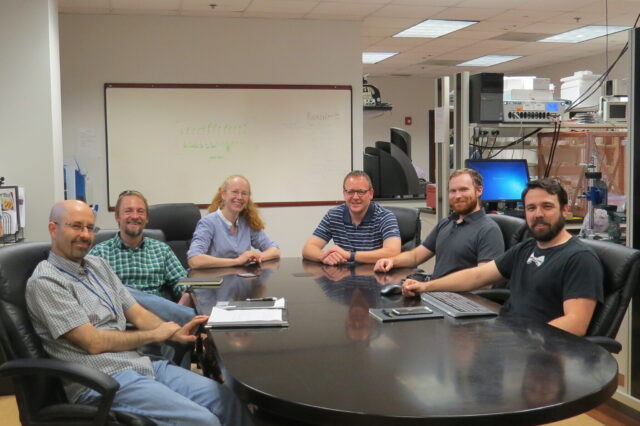UF receives up to $8.4 million from DoD to study brain training using electric stimulation

The U.S. Defense Department is looking for ways to speed up cognitive skills training — the types of skills useful for specialists such as linguists, intelligence analysts and cryptographers — and is awarding University of Florida engineers and neuroscientists up to $8.4 million over the next four years to investigate how to do that by applying electrical stimulation to peripheral nerves as a means of strengthening neuronal connections in the brain.
Two neuroengineering experts in UF’s Herbert Wertheim College of Engineering are among eight team leaders across the country receiving awards announced Wednesday under the Targeted Neuroplasticity Training program of the Defense Advanced Research Projects Agency, or DARPA. The program’s goal is to develop safe and effective enhanced training regimens that accelerate the acquisition of cognitive skills while reducing the cost and time of the DoD’s extensive training program. A large percentage of the work involves fundamental research to decipher the neural mechanisms that underlie the influence of nerve stimulation on brain plasticity.
Under an award of up to $4.2 million, Kevin J. Otto, Ph.D., will lead a team of neuroscientists from the Evelyn F. and William L. McKnight Brain Institute of the University of Florida and the Malcom Randall VA Medical Center to identify which neural pathways in the brain are activated by vagal nerve stimulation. The team will conduct behavioral studies in rodents to determine the impact of vagal nerve stimulation on perception, executive function, decision-making and spatial navigation.
This could potentially lead to an expansion of the use of vagal nerve stimulation, a therapy currently applied to prevent seizures in patients with epilepsy and to treat depression and chronic pain.
“There are clinical applications, but very little understanding of why it works,” said Jennifer L. Bizon, a professor of neuroscience at UF and an investigator on Otto’s team. “We are going to do the systematic science to understand how this stimulation actually drives brain circuits and, ultimately, how to maximize the use of this approach to enhance cognition.”
The research funded by the DARPA awards will test the mechanisms by which peripheral nerve modulations make learning faster and more efficient.
For military analysts on the job, “One hypothetical example would be target detection,” said co-investigator Barry Setlow, Ph.D., a professor of psychiatry at UF. “So for people who spend hours a day looking for things of interest on a screen, if by stimulating their vagus nerve at just the right time you can help them realize performance improvements more quickly, then they become better attuned to the fine details of images.”
The technology has the potential to help Defense Department personnel advance through training more quickly, yet effectively. “Currently, they could spend 50 years of their careers, 80 hours a week, just doing training and still wouldn’t be qualified to do every single thing,” said Otto, an associate professor in the J. Crayton Pruitt Family Department of Biomedical Engineering. “So they’re always interested in increasing mechanisms of learning and memory.”
Otto said if investigators can gain a more complete understanding of how targeted neuroplasticity works, they may be able to figure out how to optimize learning while avoiding potential side effects, such as blood pressure manipulation, heart rate changes and perceived visceral pain.
In a second UF effort, and with an additional $4.2 million award, Karim Oweiss, Ph.D., a professor of electrical and computer engineering, biomedical engineering and neuroscience, will study the mechanisms by which cranial nerve stimulation can affect brain activity. His lab will use advanced optical imaging that will produce extremely high-resolution images of brain dynamics to map the functional circuitry in areas of the brain responsible for executive function. Additionally, optogenetic interrogation, a technique to drive specific brain cells to fire or go silent in response to targeted illumination, will be used to study the causal involvement of these areas in learning cue salience and working memory formation in rodents trained on auditory discrimination and decision making tasks.
Oweiss will collaborate with Qi Wang, an assistant professor at Columbia University. Wang’s lab will focus on the noradrenergic pathway — a neuromodulator widely responsible for brain attention and arousal — and the extent to which it is engaged when rodents learn a tactile discrimination task.
Oweiss’ project seeks to demonstrate the effects of vagal nerve stimulation on cognitive-skill learning and the brain activity supporting those skills, as well as to optimize the stimulation parameters and training protocols for long-term retention of those skills.
“We want to see if it’s possible to promote targeted changes in specific brain circuits to accelerate this process by stimulating the vagus nerve, which sends close to 80 percent of its output back to the brain,” Oweiss said. “So if one knows that ‘brain area A’ talks to ‘brain area B’ when learning a new language, can we develop training protocols that promote the exchange between these two areas while leaving other areas unaltered? Then the person will learn at a faster rate and retain the skills for much longer.”
The implications of both projects reach beyond accelerated learning speeds. “If we identify specific ways that neural pathways change as a person learns, then if a person loses brain function, we could potentially rewire disconnected brain areas and personalize neural rehabilitation,” said Oweiss. “This technology could be used to restore quality of life much quicker if brain function has been compromised.”
About the author
